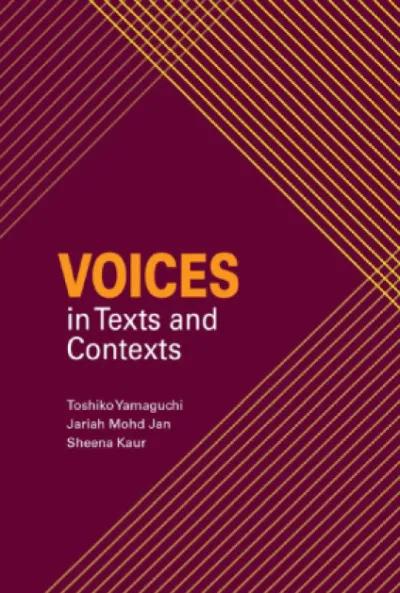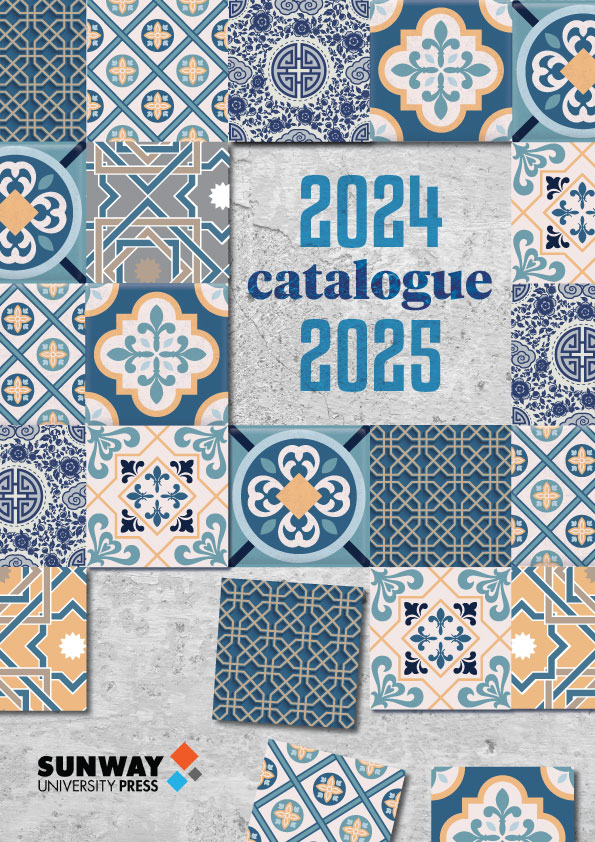
Voices in Texts and Contexts presents different perspectives of “voice”, a concept emerging from language choices, social and cultural phenomena, and psychology. In weaving a tapestry of linguistic experiences, from analyses of language phenomena including localised English to explanations of human behaviour, this book offers insights into how we use language, construct discourse, and express ourselves in light of selected texts and specific contexts.
This title is available as an e-book.
To purchase, visit your preferred e-book provider.
Voice is a fundamental instrument to interpret human behaviour and the mind. In this book, readers will learn about uses of language, or perceptions of uses, and a wide range of messages enshrined therein.
This book grew out of the 6th and 7th International Conferences on Discourse and Society organised by the Faculty of Languages and Linguistics, Universiti Malaya, Malaysia. It contains chapters that give special focus to Malaysia at the macro level—such as the naming of disabled people, mastery of the Malay language by migrants, loanwords of Sanskrit origin in Malaysian— as well contributions by invited scholars whose academic interests intersect with the theme of the volume.
This book is suitable for scholars, educators, researchers, and the interested general public.
About the Contributors
List of Abbreviations
Introduction
Toshiko Yamaguchi
Voices of Migrant Workers in a Community of Practice: A Study of Bangladeshi Migrants’ Use of the Malay Language in Malaysia
Tanzeel Chowdhury & Lee Luan Ng
Voices of Concern Amongst Teachers on the Academic Performance of Foster Children
Cherish How & Jariah Mohd Jan
Understanding and Applying the Critical Academic Voice: Bridging Theory and Practice
Stephen J Hall
Multi-Ethnic Voices of Loanwords in the Malaysian Dailies
Manjit Kaur Balwant Singh
Voices in the Naming of Disabled Persons in Print Media
Pei Soo Ang & Siang Lee Yeo
Voices of Fear: Nightmare Landscapes in Western Fantasy Literature and Fantastic Painting
Elżbieta Chrzanowska-Kluczewska
Translating English Political Discourse into Arabic: Roles of Translator, Context, and Voice
Kais Amir Kadhim
Investigating the Shift in Voice and Rhetoric of United States Administrations Regarding the Middle East 2001–2016
Mourhaf Kazzaz
Critically Negotiating British and American Englishes: Voices from Indonesia
Ribut Wahyudi
Index
Toshiko Yamaguchi is an Associate Professor at the Faculty of Languages and Linguistics, Universiti Malaya, and teaches linguistics to postgraduate students. In her earlier academic career, her research centred on synchronic and diachronic aspects of the Japanese language. She is currently engaged in two book projects, both concerning second language or L2 users/learners: one on Japanese English grammar and the other on Japanese linguistics for L2 learners.
Tanzeel Chowdhury obtained her MA degree from the Faculty of Languages and Linguistics, Universiti Malaya in 2019. She was with Oncosys International, Bangladesh before becoming a lecturer at Independent University, Bangladesh. Her Masters’ research focus is on language learning experience and identity formation of Bangladeshi migrant workers in Malaysia. She presented papers at the 17th Asia TEFL International Conference and 6th FLLT International Conference 2019 in Bangkok, Thailand, and Universiti Malaya’s Discourse and Society’s 2019 international conference in Kuala Lumpur, Malaysia.
Lee Luan Ng obtained her MA in applied linguistics from Ohio University, the United States and a PhD from the University of Otago, New Zealand. She teaches postgraduate courses related to research methodology, social dimensions of language, and language acquisition. Her research interests include computer-assisted language learning, blended learning, and interdisciplinary research that relates to health sciences. She is also a certified trainer for the software Nvivo. Her publications include Translanguaging Practices and Identity Construction of Multilingual Malaysian University Graduates in Digital Media in the journal English Teaching & Learning.
Cherish How studied pragmatics and sociolinguistics at the Faculty of Languages and Linguistics, Universiti Malaya and teaches English to undergraduate students. Her research areas include speech act of concern on children from foster homes and impoliteness in reality TV shows. She has published in GEMA Online Journal of Language Studies, Malaysian Journal of Social Sciences and Humanities, and Pertanika Journal of Social Sciences and Humanities. She has also presented papers in international conferences held in Australia, Indonesia, and Italy.
Jariah Mohd Jan is an Associate Professor at the Department of English Language and former Dean at the Faculty of Languages and Linguistics, Universiti Malaya. Her main area of research specialisation is sociolinguistics, and she has published widely on gender and power in relation to language, pragmatics, and discourse. Her recent research interest and publications focus on (im)politeness, speech acts, women and leadership, discourse at the workplace, academic concerns of children in foster care, and language and culture of the Kerinchi community.
Stephen J Hall is Professor and Head of the Centre for English Language Studies, Sunway University, where he has worked for over 13 years. He has managed Malaysian national education projects, been in business as a corporate trainer in Singapore, and trained teachers ASEAN-wide. Dr Hall has over 45 publications, including seven books, and recently co-authored Manglish: Malaysian English at Its Wackiest (2nd edition) with Lee Su Kim. He has been involved in TESOL for over 40 years and is passionate about teaching and learning in the digital age of great change.
Manjit Kaur Balwant Singh retired from Berjaya in 2006 after working there for 32 years. To fulfil her lifelong learning desire, she pursued her TESL degree at Open University Malaysia from 2010 to 2014, followed by her Masters (MESL) at Universiti Malaya from 2016 to 2019. Her keen interest in Malaysian English led her to research the loanwords of Sanskrit origin borrowed by the skillful multilinguals in Malaysia. She presented her paper on the subject at the 7th UM International Conference on Discourse and Society and has a passion for researching further.
Pei Soo Ang, PhD is a Senior Lecturer at the Faculty of Languages and Linguistics, Universiti Malaya. Her areas of research interest include discourses of disability, critical disability studies, critical discourse analysis, social semiotics, and multimodality. Her research centres on characterising the discourses of disability as represented in the Malaysian news media, employing a critical semiotic theoretical approach and a multi-perspectival methodology.
Siang Lee Yeo, PhD is a Senior Lecturer at the Faculty of Languages and Linguistics, Universiti Malaya, Kuala Lumpur. His main research interest is on interactions of individuals with communication disorders, particularly those diagnosed with autism. His current research focuses on the interactions between a small group of children with autism and their teachers in an educational setting.
Elżbieta Chrzanowska-Kluczewska, PhD is a Professor of Linguistics at the Institute of English Studies, Jagiellonian University in Krakow, Poland. Her main areas of interest cover literary semantics, stylistics, poetics, philosophy of language, and artistic semiotics. Her monographs include Language-Games: Pro and Against (Universitas, 2004) and Much More than Metaphor: Master Tropes of Artistic Language and Imagination (Peter Lang, 2013), and she co-edited a collected monograph Language–Literature–the Arts: A Cognitive-Semiotic Interface (Peter Lang, 2017). She is a board member of the International Association of Literary Semantics and served on the editorial board of Journal of Literary Semantics from 2005 to 2020.
Kais Amir Kadhim is an Assistant Professor of Linguistics and Translation at the Faculty of Language Studies, Sohar University, Oman. He obtained his PhD in translation from Universiti Sains Malaysia, and teaches linguistics and translation. In 2015, he was awarded a DAAD scholarship to advance his research work at Munich University, Germany. His research interests include stylistics, discourse of media, and the structure of the English language. His latest publication is The Functional Use of Imperative in the Translated Chapter of Joseph in SKASE Journal of Translation and Interpretation.
Mourhaf Kazzaz is a PhD candidate at the Jindal School of International Affairs, OP Jindal Global University, India. He studied English Language and Literature at Aleppo University, Syria before pursuing his Masters at Mangalore University, India on an Indian Council for Cultural Relations scholarship. His research is centred on the link between political paradigms and their linguistic representation in the context of contemporary Middle East politics. He also worked as a full-time lecturer of English for Special Purposes at Al Furat University, Syria.
Ribut Wahyudi is a lecturer at the Faculty of Humanities, Universitas Islam Negeri Maulana Malik Ibrahim Malang, Indonesia. He gained his MEd in TESOL from University of Sydney, Australia in 2010 and PhD in critical and interdisciplinary ELT from Victoria University of Wellington, New Zealand in 2018. He has published book chapters, among other things, with Palgrave Macmillan and Routledge, and an article in Journal of IATEFL ESP SIG 2016. He has reviewed articles for major international journals.
Sheena Kaur is a Senior Lecturer at the Faculty of Languages and Linguistics, Universiti Malaya, and currently Deputy Dean of Postgraduate Studies. She obtained her doctoral degree in Applied Linguistics from Lancaster University. Her research interests include applied linguistics, internationalisation of higher education, sociolinguistics, and the use of corpus methodology. She has presented at several national and international conferences and is a reviewer for several journals. Her most recent publications include a commentary on the coronavirus pandemic in Malaysia in the journal Psychological Trauma: Theory, Research, Practice, and Policy.
Basic Information
- 978-967-5492-55-6 (Hardback)
- 978-967-5492-57-0 (E-book)



